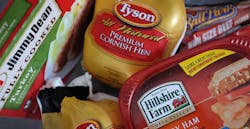Tyson Faces Sluggish Sales, While Trying to Expand Globally
On the same day that America’s biggest meat company disappointed investors with sluggish sales, it showed them what it’s doing about it: chasing greener pastures abroad.
Tyson Foods Inc. said low pork and chicken prices dragged down sales in the first quarter, according to a statement Thursday. To combat the lackluster market conditions, the meat giant has turned to deals to expand its global footprint and its offerings of value-added products, like chicken nuggets. Earlier in the day, Tyson said it was purchasing six facilities from Brazil’s BRF SA for $340 million, including operations in Asia and the U.K.
Shares of Tyson dropped 2% to $59.67 as of 10:41 a.m. in New York.
It’s getting harder to make money by selling commodity meat like Tyson did for so many years. A boom in U.S. production has dragged down prices for pork, chicken and beef -- with little sign the trend will let up soon. At the same time, changing consumer tastes and lifestyles mean Americans want food that’s perceived as healthier, easier to cook and increasingly, they want protein that comes from plants.
Tyson is refashioning itself to meet those demands by focusing on value-added products, such as pre-cut meats and prepared foods. It spent more than $2 billion last year on Keystone Foods, expanding its chicken-nugget offerings. The company is also looking more at alternative proteins. Tyson has stakes in Beyond Meat, a plant-based burger manufacturer, and Memphis Meats, a cultured-meat producer that’s backed by Cargill Inc., Bill Gates and Richard Branson.
On a conference call Thursday to discuss earnings, Chief Executive Officer Noel White said the company is planning to announce new alternative-protein products in the “weeks ahead.”
The primary focus for upcoming deals will be on “value-added foods,” White said on the call, while saying that international growth comes after.
Tyson’s purchase of the BRF plants, comprising four poultry operations in Thailand and two prepared chicken plants in the U.K. and the Netherlands, is almost all “value-added,” White said.
Tyson has held talks to buy closely held U.S. meat company Foster Farms for about $2 billion, CNBC reported this week. Still, White said the company will be “very disciplined” with future acquisitions and that it’s committed to the businesses it’s already bought.
Foster Farms sells poultry products like seasoned chicken cuts, ground turkey and frozen chicken nuggets and strips, according to its website. It also produces deli meats and frozen corn dogs.
The company said margins for its chicken business would be about 6% in 2019. That compares with 9.4% last year.
Tyson’s “concession that the chicken segment will likely remain challenged by heavily supplied market conditions was a bit disappointing,” said Ken Shea, an analyst at Bloomberg Intelligence.
While Tyson’s sales missed estimates, earnings per share were $1.58, compared with $1.56 forecast by analysts. The company affirmed its guidance for the full fiscal year.
White pointed to Chinese demand for pork as a possible bright spot ahead. The Asian country is dealing with an outbreak of African swine fever, the deadly pig-disease that is forcing producers to cull herds. Some analysts have predicted that China will eventually be forced to import more pork to meet demand in the world’s top consumer market. The outbreak could be even worse than what’s being reported, White said, adding that Tyson wasn’t including any potential benefit from African swine fever in its guidance.
The U.S. pork industry is currently contending with tariffs from China, amid the trade war between the nations. Tyson expects “sizeable upside” to its pork business if China returns to the American market, executives said on the call.
About the Author
Bloomberg
Licensed content from Bloomberg, copyright 2016.
